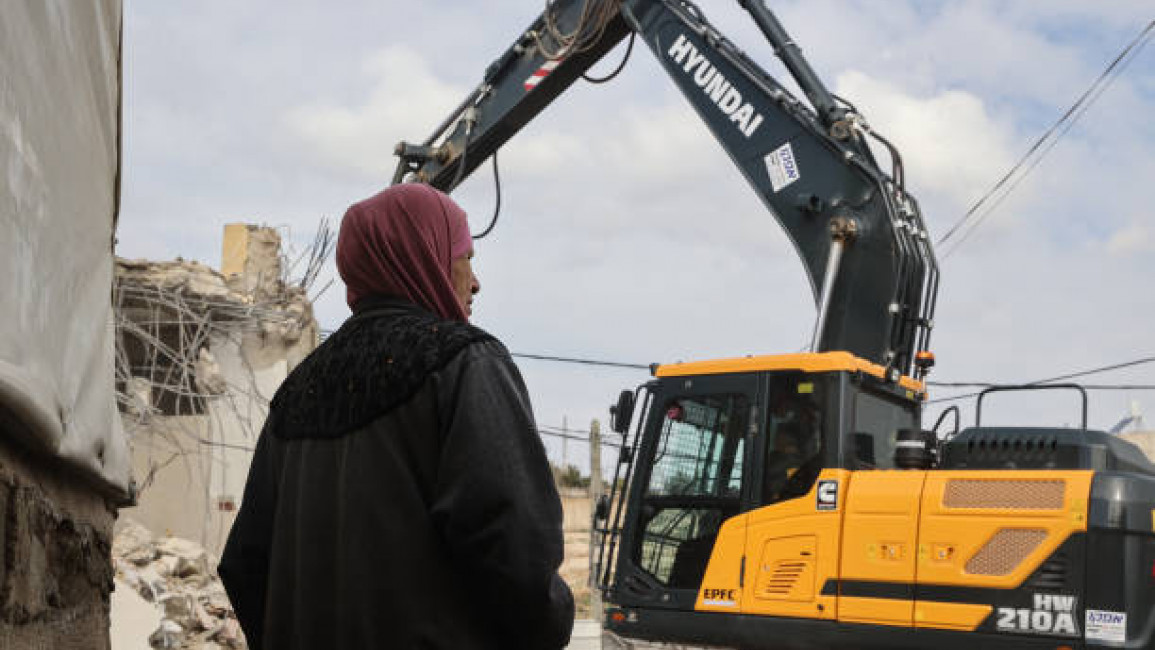Palestinians protest Israel's mass home demolition plans in Jerusalem
Palestinians protested on Sunday in front of the Israeli municipality building in Jerusalem against the demolition of Palestinian houses by authorities in the occupied city.
The protest was organised by residents of the Jabal Al-Mukaber neighbourhood, where hundreds of Palestinian houses face the threat of demolition, mostly due to the owners lacking construction permits.
One of the protesters told Palestinian media that the demonstrators were demanding an end to the Israeli policy, which they say aims at expelling Palestinians from the city.
"It is a racist policy," he said. "People are aware of it today, and they are aware of the Israeli 'Kemints' law, which will force thousands to see their homes demolished."
The 'Kemints' law was approved as an amendment to the Israeli planning and building law by the Knesset in 2017.
It limits Israeli judges' ability to delay the execution of demolition orders, while increasing the fees imposed on Palestinians who ignore orders to demolish their properties themselves, with Israeli authorities raising the buildings instead and charging the owners.
In 2019, Palestinian lawyer Qais Nasser Arab 48 that in the first nine months of the 'Kemints' law implementation, Israeli authorities charged Palestinians in Jerusalem more than 15 million shekels ($4.6 million) in demolition fees.
The law is a "tool that serves Israel's larger policy of reducing the numbers of Palestinians in Jerusalem", according to Munir Nasibeh, a legal expert and director of the Lagal Clinic in Jerusalem.
"Before the law was passed, urban planning in Jerusalem was already discriminatory," he said. "Only 13 percent of the city's surface is given to Palestinians to build on and that number hasn't changed since 1967. This small space is already over-crowded with buildings, while some 33 percent are reserved for Israeli settlements."
The result is that between 50 and 66 percent of Palestinian structures in Jerusalem are built without permits, and therefore subject to demolition, even after years of paying fees to Israeli authorities, Nasibeh added.
Press coverage: "Israeli occupation authorities demolished the dream of the Jerusalemite family, Nassib Obaid, in Al-Isawiya town in occupied Jerusalem, to build a house that could accommodate him and his five children, with an unjust demolition decision." pic.twitter.com/LCL3k5CKTg
— AlQastal News (@QastalNewsEn) February 19, 2022
According to the UN Office of Coordination of Humanitarian Affairs in the Palestinian territories - OCHA, between 25 January and 7 February Israel demolished 175 Palestinian properties in East Jerusalem.
Two of those were the twin houses of the Karameh family, home to 16 people, including 12 minors.
Hamdi Karameh, a family member, told The New Arab that he and his siblings had paid more than 800.000 shekels ($256,000) in fees over 20 years.
According to Karameh, his lawyer had attempted a last minute bid to delay the demolition, but the Israeli municipality's crews had already arrived without notice.
According to Israeli official data, only 7 percent of Israeli building permits in Jerusalem go to Palestinians.
Israel occupied East Jerusalem in the 1967 Arab-Israeli war, then annexed it in 1981 in a move widely seen as illegal under international law.



